|
Books Should Be Free Loyal Books Free Public Domain Audiobooks & eBook Downloads |
|
|
Books Should Be Free Loyal Books Free Public Domain Audiobooks & eBook Downloads |
|
Humorous Books |
|---|
|
Book type:
Sort by:
View by:
|
By: P. G. Wodehouse (1881-1975) | |
|---|---|
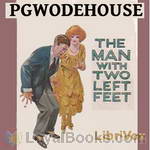 The Man With Two Left Feet, and Other Stories
The Man With Two Left Feet, and Other Stories
The Man With Two Left Feet, and Other Stories is a collection of short stories by P. G. Wodehouse, first published in the United Kingdom on March 8, 1917 by Methuen & Co., London, and in the United States in 1933 by A.L. Burt and Co., New York. All the stories had previously appeared in periodicals, usually the Strand in the UK and the Red Book magazine or the Saturday Evening Post in the US. It is a fairly miscellaneous collection — most of the stories concern relationships, sports and household... | |
 Not George Washington
Not George Washington
It has been said that behind every successful man is a good woman. This is certainly true in the case of James Orlebar Cloyster. However, some funny things happened on his road to success. His story is humorously told from the point of view of several parties involved.According to Wikipedia, the book is a humorous, fictionalized account of Wodehouse's early years as a journalist, with Wodehouse being portrayed by the character of Cloyster. | |
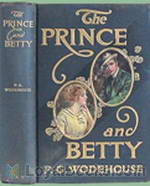 The Prince and Betty
The Prince and Betty
The Prince and Betty is a novel by P. G. Wodehouse. It was originally published in Ainslee's Magazine in the United States in January 1912, and, in a slightly different form, as a serial in Strand Magazine in the United Kingdom between February and April 1912, before being published in book form, in the UK only, by Mills & Boon, London, on 1 May that year. A substantially different version, which incorporated the plot of Psmith, Journalist, was published in the US by W. J. Watt, New York on 14 February 1912, and is the only version now widely available... | |
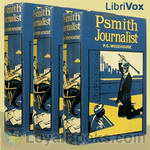 Psmith, Journalist
Psmith, Journalist
Psmith takes over editing a paper while the usual editor is away on vacation. He takes on a local slum lord, and divers alarums ensue. (description by Psuke Bariah) | |
By: Eleanor H. Porter (1868-1920) | |
|---|---|
 Oh, Money! Money!
Oh, Money! Money!
Mr. Stanley Fulton is worth millions, but he has no one to leave his money to except some unknown distant cousins. In order to find out how they would handle a fortune, he decides to give each of them $100,000 dollars during his life, and go – incognito - to live in their midst! Who will prove worthy to inherit his millions and will his deception be discovered?Eleanor H. Porter was an early 20th century author of children’s literature and novels. Her most well known book was “Pollyanna” and it’s sequel, “Pollyanna Grows Up”. | |
By: Edgar Allan Poe | |
|---|---|
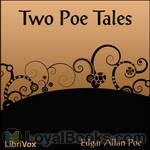 Two Poe Tales
Two Poe Tales
Edgar Allan Poe is best known for his famous short horror stories; however, horror is not the only genre in which he wrote. How To Write a Blackwood Article and its companion piece A Predicament are satirical works exploring the pieces of the formula generally seen in short horror stories (”articles”) found in the Scottish periodical “Blackwood’s Magazine” and the successful misapplication of said formula by – horrors! – a woman author! – respectively. | |
By: Stephen Leacock (1869-1944) | |
|---|---|
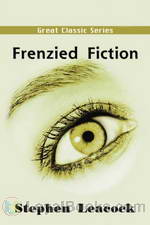 Frenzied Fiction
Frenzied Fiction
From the cave man to Santa Claus; spies, know-it-alls, and journalists: all are fair game for Leacock’s special brand of humor. He touches on the changes time has brought about in the city, education, and work habits. Among the other topics in this work are nature, fishing, gardening, success, and spirits–both of the departed and of the variety Prohibition prohibited. Each chapter of this book is a standalone story and if you love a good laugh, these stories are for you. In me, Leacock’s wit produced the full range of laughter: smiles, chuckles, guffaws, and some uncontrollable giggles. Also, occasionally, I found myself shedding a tear or two. (Review by Debra Lynn) | |
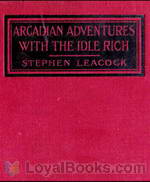 Arcadian Adventures with the Idle Rich
Arcadian Adventures with the Idle Rich
“Arcadian Adventures with the Idle Rich” is a work of humorous fiction by Stephen Leacock first published in 1914. It is the follow-up to his 1912 classic “Sunshine Sketches of a Little Town.” Like that work, it is a sequence of interlocking stories set in one town, but instead of focusing on a small Canadian town in the countryside, it is set in a major American metropolis and its characters are the upper crust of society. Although currently not as well-known as the earlier book, “Arcadian Adventures” was extremely popular in North America at the time of its publication and for a while was considered the greater success... | |
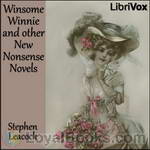 Winsome Winnie and other New Nonsense Novels
Winsome Winnie and other New Nonsense Novels
Eight silly stories by Canadian humourist Stephen Leacock. | |
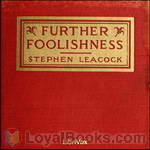 Further Foolishness
Further Foolishness
Seventeen goofy stories and essays by Canadian humourist Stephen Leacock. "Professor Leacock has made more people laugh with the written word than any other living author. One may say he is one of the greatest jesters, the greatest humorist of the age." – A. P. Herbert (Introduction by TriciaG & Wikipedia) | |
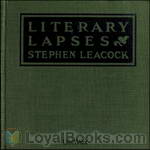 Literary Lapses
Literary Lapses
Short sketches relating the humourous side of life in 1910. "Professor Leacock has made more people laugh with the written word than any other living author. One may say he is one of the greatest jesters, the greatest humorist of the age." – A. P. Herbert | |
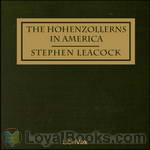 The Hohenzollerns in America
The Hohenzollerns in America
More stories by Canadian Stephen Leacock. Some of these stories carry over characters introduced in Further Foolishness. Some stories are humourous; some are more thoughtful. It helps to be familiar with WWI-era European politics to catch much of the humour. Full title: The Hohenzollerns in America With the Bolsheviks in Berlin and Other Impossibilities | |
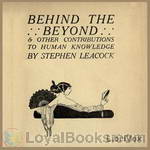 Behind the Beyond
Behind the Beyond
A collection containing a parody on Problem Plays, as well as humorous anecdotes from Canadian humourist Stephen Leacock. | |
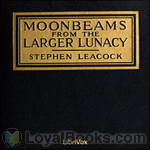 Moonbeams from the Larger Lunacy
Moonbeams from the Larger Lunacy
Humorous, ironic, and sometimes cynical observations of life in 1915 from Canadian humourist Stephen Leacock. | |
By: F. Scott Fitzgerald | |
|---|---|
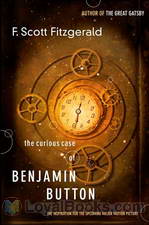 The Curious Case of Benjamin Button
The Curious Case of Benjamin Button
A life lived backwards, with events happening in reverse order forms the strange and unexpected framework of one of F Scott Fitzgerald's rare short stories. The Curious Case of Benjamin Button was published in Collier's in 1927 and the idea came to Fitzgerald apparently from a quote of Mark Twain's in which he regretted that the best part of life came at the beginning and the worst at the end. Fitzgerald's concept of using this notion and turning the normal sequence of life on its head resulted in this delightful, thought provoking fantasy tale... | |
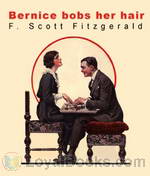 Bernice Bobs Her Hair
Bernice Bobs Her Hair
Pretty but socially clueless Bernice lets her know-it-all cousin push her around, but eventually, something's gotta give! (Introduction by BellonaTimes) | |
By: Henry James (1843-1916) | |
|---|---|
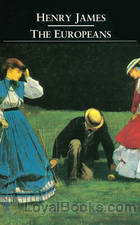 The Europeans
The Europeans
The Europeans: A sketch is a short novel by Henry James, published in 1878. It is essentially a comedy contrasting the behaviour and attitudes of two visitors from Europe with those of their relatives living in the ‘new’ world of New England. The novel first appeared as a serial in The Atlantic Monthly for July-October, 1878. James made numerous minor revisions for the first book publication. | |
By: Jonathan Swift (1667-1745) | |
|---|---|
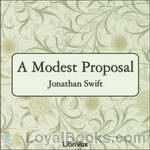 A Modest Proposal
A Modest Proposal
A satirical essay written by one of the most renowned satirists, Jonathan Swift, A Modest Proposal expresses the author’s exasperation with the ill treatment of impoverished Irish citizens as a result of English exploitation and social inertia. Furthermore, Swift ventilates the severity of Ireland’s political incompetence, the tyrannical English policies, the callous attitudes of the wealthy, and the destitution faced by the Irish people. Focusing on numerous aspects of society including government exploitation, reckless greed, hypocrisy, apathy, and prejudice, the essay successfully exemplifies Swift’s satirical skills... | |
By: Anthony Trollope (1815-1882) | |
|---|---|
 Miss Mackenzie
Miss Mackenzie
The thirty-five year-old (hence utterly over-the-hill) Miss Margaret Mackenzie, having devoted her life to others, suddenly finds herself with no one to care for, and in possession of a moderate fortune. Having money, she is now much sought-after and no longer universally deemed too old to marry. Partly because she has spent her life taking care of the brother whose money she has now inherited, she has no experience of wealth or popularity. Miss Mackenzie is the definition of “other-oriented. (Indeed, Trollope originally considered naming the novel, and his heroine, “Griselda”, presumably to invoke the folkloric character’s qualities of stolid obedience and endless patience... | |
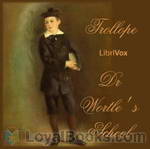 Doctor Wortle's School
Doctor Wortle's School
Anthony Trollope’s fortieth novel, published in 1881, concerns a respectable Christian boys’ school whose proprietor unknowingly hires a woman who apparently has two husbands: A devoted English scholar and an abusive drunkard from the American south. The book interweaves a sensitive and realistic exploration of Dr. Wortle’s moral dilemma with a humorous look at small-town gossip and--of course--a romance involving the doctor’s beautiful young daughter. ( | |
 Is He Popenjoy ?
Is He Popenjoy ?
Trollope returns in Is He Popenjoy to two of his favorite subjects: property and inheritance. As in "Doctor Thorne," the issues are complicated by the specter of possible illegitimacy. Lord George Germain, a thoroughly respectable, upstanding, if not particularly bright younger son with new wife, rather expects to inherit a title, since his vicious and dissolute elder brother, the Marquis of Brotherton, who lives in Italy, shows no signs of settling down and producing heirs. Then comes a thunderbolt in the form of a letter from the Marquis suddenly claiming that he has, late in life, married an Italian widow and sired a son... | |
 Struggles of Brown, Jones, and Robinson
Struggles of Brown, Jones, and Robinson
Billed as a satire concerning the dishonest advertising and business practices of the day, it tells the tale of an upstart clothing business doomed from the get-go to utter failure. Its senior partner (the elderly Brown, who provides the investment) is far too timid for business. His son-in-law (Jones, who runs the store) is stealing from the till, and the junior partner, Robinson (who writes advertisements for the store) is so obsessed with the idea that advertising alone will drive the business, he uses up every last penny of the capital investment in a series of increasingly ludicrous ad campaigns and publicity stunts... | |
By: Edward M. Forster (1879-1970) | |
|---|---|
 Where Angels Fear to Tread
Where Angels Fear to Tread
On a journey to Tuscany with her young friend and traveling companion Caroline Abbott, widowed Lilia Herriton falls in love with both Italy and a handsome Italian much younger than herself, and decides to stay. Furious, her dead husband’s family send Lilia’s brother-in-law to Italy to prevent a misalliance, but he arrives too late. Lilia marries the Italian and in due course becomes pregnant again. When she dies giving birth to her child, the Herritons consider it both their right and their duty to travel to Monteriano to obtain custody of the infant so that he can be raised as an Englishman. | |
By: Jerome K. Jerome (1859-1927) | |
|---|---|
 Told after Supper
Told after Supper
It is Christmas Eve, and the narrator, his uncle and sundry other local characters are sitting round the fire drinking copious quantities of whisky punch and telling ghost stories until bedtime, when… But no, I won’t spoil the fun. This is a little gem: Jerome at his tongue-in-cheek best. | |
 Stage Land
Stage Land
A comic look at the curious habits and customs of the inhabitants of ‘Stage Land’. Dedicated to ‘that highly respectable but unnecessarily retiring individual, of whom we hear so much but see so little, “the earnest student of drama” | |
 They and I
They and I
A man and his three children leave the “Little Mother” at home in the city and set up temporary housekeeping in a country cottage to supervise the remodeling of the house he has just purchased there. The story is narrated by the father. His interactions with his children, interspersed with his own recollections of past events, make for hilarious reading. This is Jerome at his best, IMHO, although this is apparently one of this lesser known novels. | |
 Idle Ideas in 1905
Idle Ideas in 1905
Back in 1905 Jerome K. Jerome shared his thoughts on a variety of subjects, including "Should Women Be Beautiful?", "Should Soldiers Be Polite?" and "Is The American Husband Made Entirely Of Stained Glass?". Every subject is analysed and commented on in the witty and satirical style we have grown to expect from the author. | |
By: Arnold Bennett (1867-1931) | |
|---|---|
 The Regent
The Regent
'The Regent' is, if not a sequel to 'The Card', then a 'Further Adventures of' the eponymous hero of that novel.Denry Machin is now forty-three and begins to feel that he is getting old, that making money and a happy home life are not enough and that he has lost his touch as the entrepreneur and entertainer of the 'Five Towns'.In fact, as he says to himself 'What I want is change - and a lot of it too!'. A chance meeting at the local theatre leads to his going to London and then... | |
By: O. Henry (1862-1910) | |
|---|---|
 Gentle Grafter
Gentle Grafter
If Jefferson "Parleyvoo" Pickens had appeared in print just a few years later, he might have been the "Gentle Grifter" instead of the "Gentle Grafter", the name O. Henry picked for him. His situation as an ethical graft artist gives Jeff an extra impediment in pursuing his craft, but he never wanted it to be too easy. The result is fourteen delightful tales for us and a number of new partners for him. With those partners (he always has at least one) he works his way through a number of confidence games... | |
By: Edmund Spenser (1552?-1599) | |
|---|---|
 Amoretti: A sonnet sequence
Amoretti: A sonnet sequence
The Amoretti (meaning little love poems) is a sequence of 89 sonnets written in the tradition of the Petrarchan sonnets, a popular form for poets of the Renaissance period. Spenser’s sequence has been largely neglected in modern times, while those of his contemporaries William Shakespeare and Sir Philip Sidney have been acclaimed. However, because of the artistic skill, along with the emotion and the humor exhibited, these poems deserve a broader hearing, even though they may be somewhat difficult for the present-day reader, partly through Spenser’s love for words and expressions that were already archaic in his time... | |
By: Andrew Lang (1844-1912) | |
|---|---|
 HE
HE
This book is a parody of the famous swashbuckling novel, She, by H. Rider Haggard. Her beauties are beyond the reach of danger from Burlesque, nor does her form flit across our humble pages.” (taken from the Dedication) | |
By: Washington Irving (1783-1859) | |
|---|---|
 The Sketch Book of Geoffrey Crayon, Gent.
The Sketch Book of Geoffrey Crayon, Gent.
Apart from "Rip Van Winkle" and "The Legend of Sleepy Hollow" - the pieces which made both Irving and The Sketch Book famous - other tales include "Roscoe", "The Broken Heart", "The Art of Book-making", "A Royal Poet", "The Spectre Bridegroom", "Westminster Abbey", "Little Britain", and "John Bull". His stories were highly influenced by German folktales, with "The Legend of Sleepy Hollow" being inspired by a folktale recorded by Karl Musaus. Stories range from the maudlin (such as "The Wife" and... | |